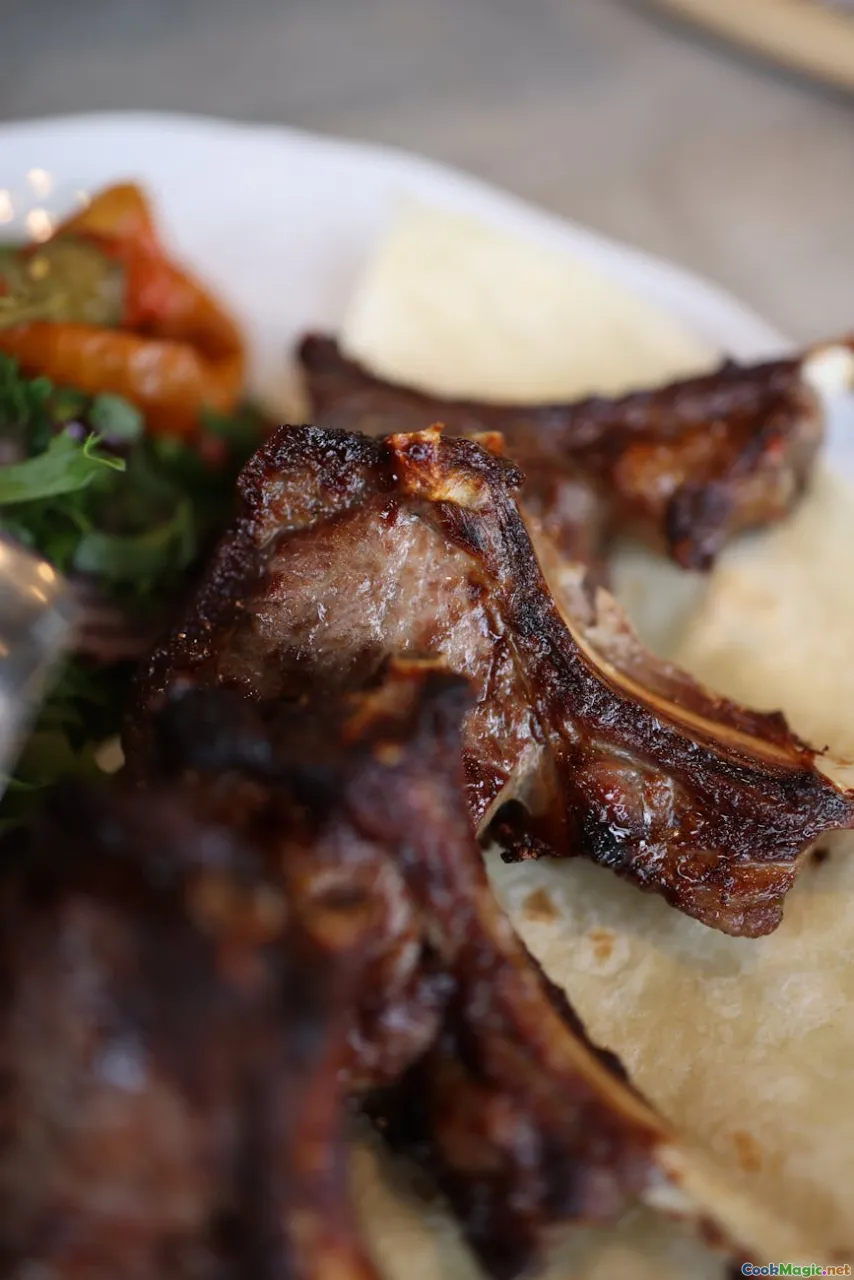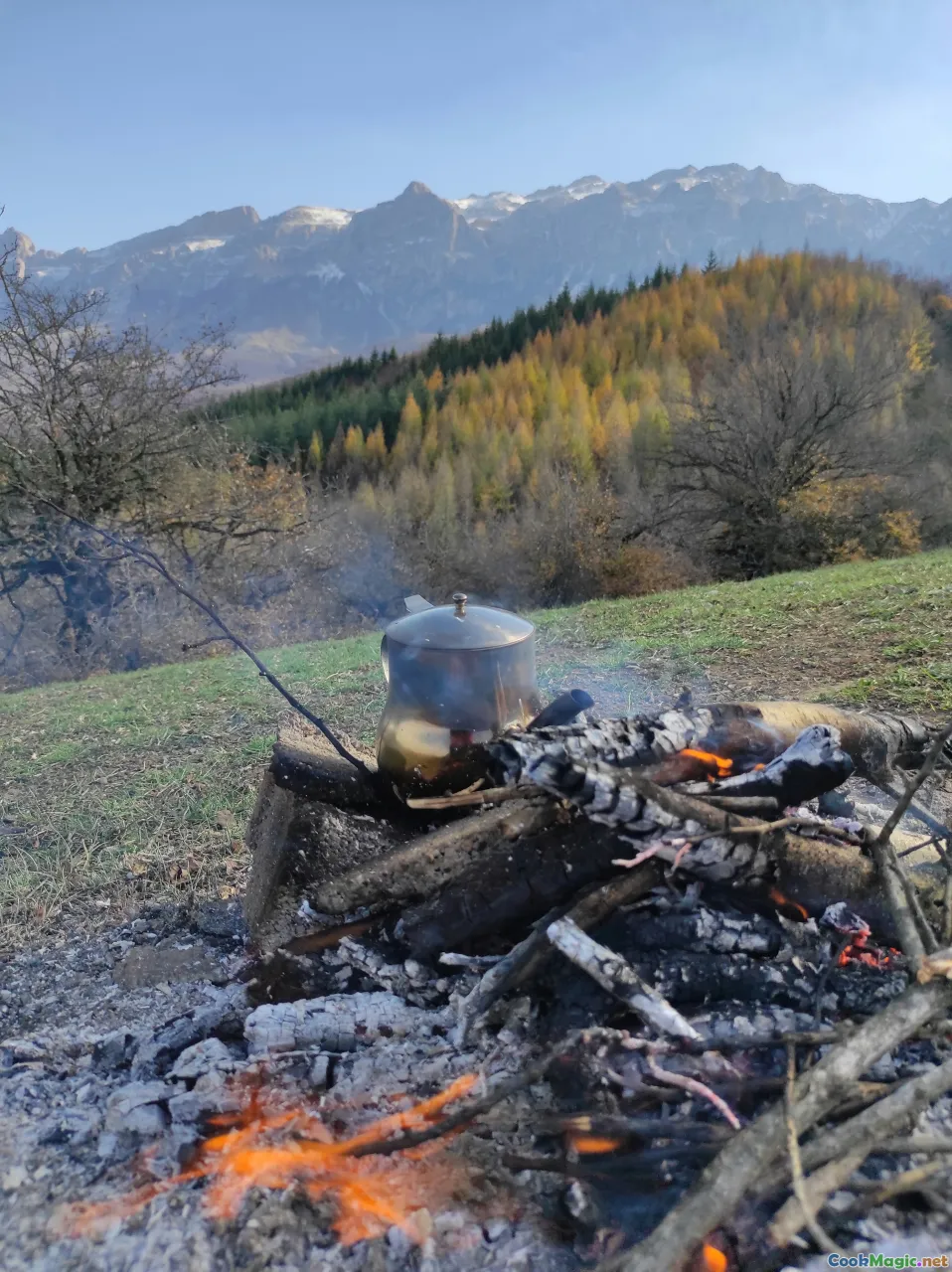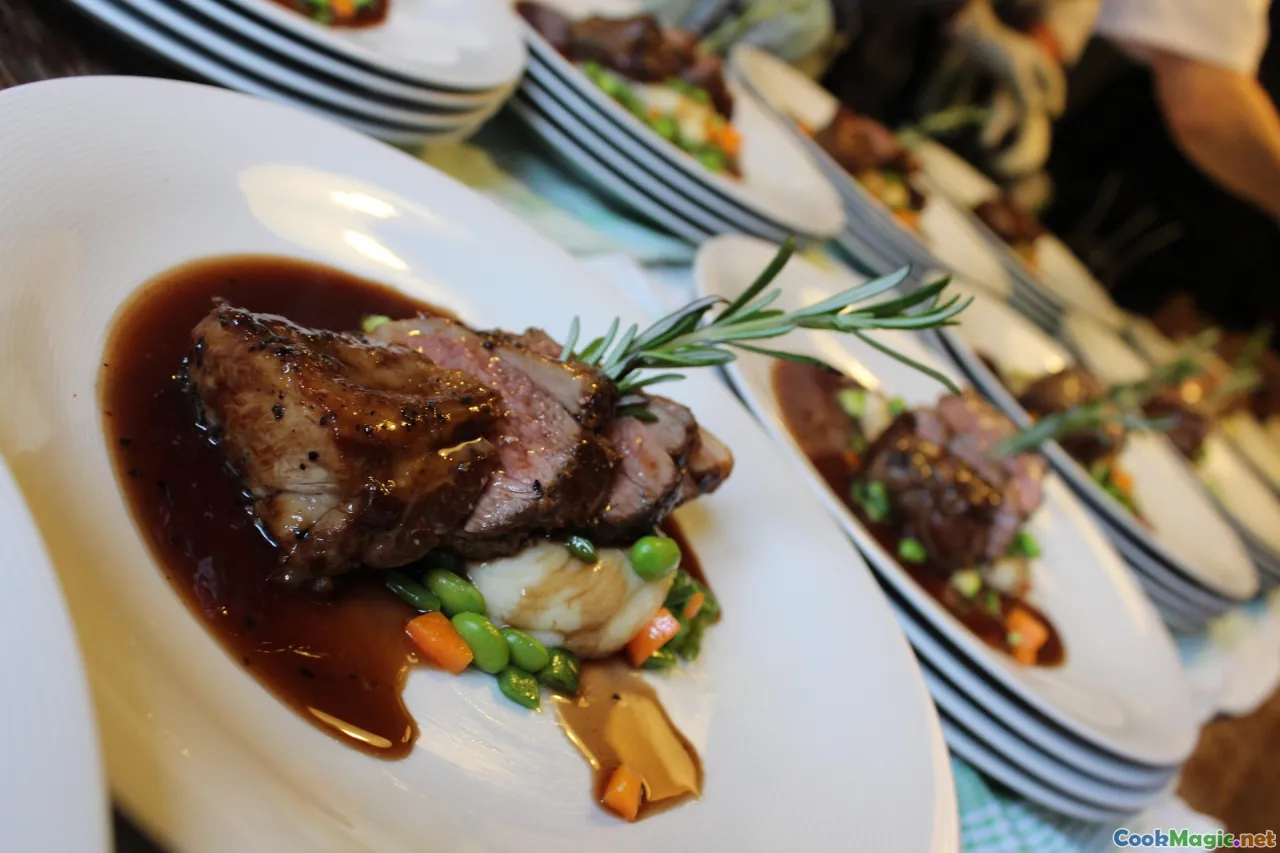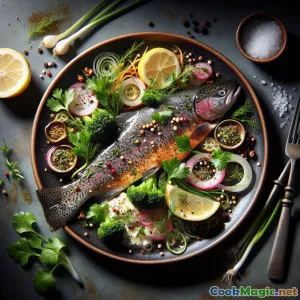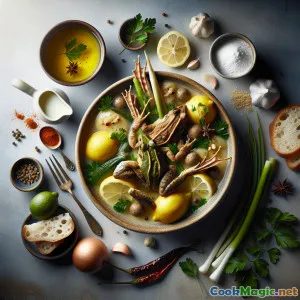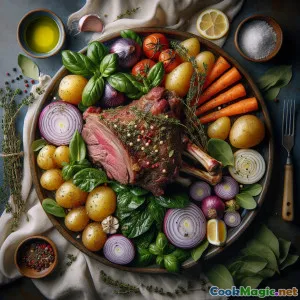
Panggang Bawang Alam Foča dan Domba Lezat dan Juicy
(Foča Wild Garlic and Succulent Lamb Roast)
(0 Ulasan)0
1,199
Juli 22, 2025
Laporkan Masalah
Bahan
-
1.5 kg Bahunya domba, dengan tulang
(Trim excess fat, keep some for flavor)
-
70 grams Daun bawang liar (ramsons)
(Washed, roughly chopped)
-
600 grams Kentang
(Peeled, cut into large cubes)
-
200 grams Wortel
(Peeled, cut into thick rounds)
-
1 large Bawang merah
(Sliced lengthwise)
-
5 whole Siung bawang putih
(Hancurkan dengan lembut)
-
3 tablespoons Minyak zaitun
(Lebih disarankan menggunakan extra virgin)
-
6 sprigs Thyme Segar
(Strip leaves if stems are woody)
-
1 whole lemon Kulit lemon
(Diparut halus)
-
2 teaspoons Garam laut
(Flaked or kosher salt preferable)
-
1 teaspoon Lada hitam baru giling
-
1/2 teaspoon Sumac
(Adds tangy flavor)
-
120 ml anggur putih kering
(Can substitute with lamb stock)
(Trim excess fat, keep some for flavor)
(Washed, roughly chopped)
(Peeled, cut into large cubes)
(Peeled, cut into thick rounds)
(Sliced lengthwise)
(Hancurkan dengan lembut)
(Lebih disarankan menggunakan extra virgin)
(Strip leaves if stems are woody)
(Diparut halus)
(Flaked or kosher salt preferable)
(Adds tangy flavor)
(Can substitute with lamb stock)
Nutrisi
- Porsi: 4
- Ukuran Porsi: Piring besar (sekitar 350g)
- Calories: 615 kcal
- Carbohydrates: 33 g
- Protein: 35 g
- Fat: 34 g
- Fiber: 6 g
- Sugar: 7 g
- Sodium: 900 mg
- Cholesterol: 120 mg
- Calcium: 90 mg
- Iron: 4 mg
Instruksi
-
1 - Prepare and Marinate the Lamb:
Pat dry lamb shoulder. In a bowl, combine olive oil, sea salt, pepper, thyme leaves, crushed garlic, and lemon zest. Rub this mixture deeply into all surfaces of the meat, making shallow incisions to embed some wild garlic. Place seasoned lamb in a large dish, cover with plastic wrap, and let marinate for 2 hours (or overnight for maximum flavor). Meanwhile, bring the lamb close to room temperature before roasting.
-
2 - Preheat Oven and Prepare Vegetables:
Preheat oven to 180°C (356°F). Arrange cubed potatoes, carrots, red onion slices, and the rest of the wild garlic in a roasting tray. Drizzle with olive oil, sprinkle lightly with salt, and toss to coat evenly.
-
3 - Roast Lamb & Vegetables:
Place marinated lamb shoulder atop the bed of vegetables. If using, sprinkle sumac over the top. Pour white wine around (not over) the lamb. Cover tightly with foil. Roast in oven for 1 hour.
-
4 - Uncover and Continue Roasting:
After 60 minutes, remove foil. Baste lamb with pan juices. Continue roasting, uncovered, for an additional 40-60 minutes, spooning pan juices over lamb once or twice, until golden and tender. Vegetables should be soft and beginning to brown at the edges.
-
5 - Rest and Serve:
Transfer lamb to a cutting board. Rest for 10-15 minutes. Slice or shred lamb, serving with roasted potatoes, vegetables, and extra wild garlic if desired. Spoon over pan juices to finish.
Pat dry lamb shoulder. In a bowl, combine olive oil, sea salt, pepper, thyme leaves, crushed garlic, and lemon zest. Rub this mixture deeply into all surfaces of the meat, making shallow incisions to embed some wild garlic. Place seasoned lamb in a large dish, cover with plastic wrap, and let marinate for 2 hours (or overnight for maximum flavor). Meanwhile, bring the lamb close to room temperature before roasting.
Preheat oven to 180°C (356°F). Arrange cubed potatoes, carrots, red onion slices, and the rest of the wild garlic in a roasting tray. Drizzle with olive oil, sprinkle lightly with salt, and toss to coat evenly.
Place marinated lamb shoulder atop the bed of vegetables. If using, sprinkle sumac over the top. Pour white wine around (not over) the lamb. Cover tightly with foil. Roast in oven for 1 hour.
After 60 minutes, remove foil. Baste lamb with pan juices. Continue roasting, uncovered, for an additional 40-60 minutes, spooning pan juices over lamb once or twice, until golden and tender. Vegetables should be soft and beginning to brown at the edges.
Transfer lamb to a cutting board. Rest for 10-15 minutes. Slice or shred lamb, serving with roasted potatoes, vegetables, and extra wild garlic if desired. Spoon over pan juices to finish.
Informasi Lebih Lanjut: Panggang Bawang Alam Foča dan Domba Lezat dan Juicy
Foča Wild Garlic and Lamb Roast: History, Significance, and Chef's Insights
The majestic region surrounding Foča in southeastern Bosnia and Herzegovina is famed for its untouched nature, emerald rivers, rolling mountain meadows, and culinary wealth shaped by centuries of cross-cultural exchange. The wild garlic (Allium ursinum)—known locally as 'srijemuš'—flourishes throughout the carstline woods and meadows in springtime. This aromatic herb has starred in foraged-centric local cuisine since pre-Ottoman times, prized for its fresh garlicky zing, detoxifying qualities, and health benefits. Paired with lamb, an esteemed meat for festive gatherings (particularly at Easter), the combination becomes emblematic of pastoral Bosnian cookery, both humble and celebrational.
Historical Context & Evolution
Spring in Bosnia and Herzegovina is not just a season; it is an awakening. As the snow melts and the hills blush green, villagers traditionally venture into woodlands to pick bouquets of wild garlic, instinctively knowing its presence signals the time for renewal. Wresting life from the wild, srijemuš was once an important vitamin source after long winters. Combined with lamb—often cooked for Orthodox Easter, Bajram, or family gatherings—the marriage of ingredients encapsulates the coming together of earth's revival and communal celebration.
Traditionally, whole lambs are spit-roasted outdoors, but housewives throughout Drina Valley learned to adapt. Baking lamb shoulder atop a nest of aromatic local herbs and roasted root vegetables in a home oven became popular for urban as well as rural families. Wild garlic, often layered throughout, imparts freshness that transcends ordinary roast lamb.
Unique Aspects of the Recipe
What distinguishes this Foča-influenced roast from standard lamb roasts is the artistry of pairing strong, gamy, spring lamb with the pungency of wild garlic. The herb's oils mellow in the oven, bathing both meat and vegetables in freshness without overwhelming. Adding a touch of sumac is a contemporary chef’s nod to wider Balkan and Ottoman influences, lending subtle citrus tang.
Potatoes and carrots, rustic and locally grown, anchor the roast beneath. This arrangement means any escaping lamb juice seeps into the roots from above, enriching them with savory drippings. Lemon zest brightens, tying together richness and radiant herbality.
Another hallmark is marinating the meat for at least two hours, and ideally overnight. Essential oils from wild garlic, thyme, and lemon, infused initially and refreshed during roasting and basting, contribute layer upon layer of flavor.
Tips, Variations, and Serving Suggestions
- Wild Garlic Out of Season? Substitute with fresh ramps or a mix of baby spinach and just a clove or two of conventional garlic.
- Lamb Too Gamey? Consider using young spring lamb leg. Meat from bone-in cuts delivers best flavor and juiciness.
- Vegetable Customization: Leeks, parsnips, or celeriac all suit this rustic pan-roast. Add when root vegetables are prepped.
- Wine or Stock? Balkans prefer using a splash of homemade stock, but dry white wine elevates and gently steams the bed below, creating jus for serving.
- Serving Suggestions: Pile thick slices of lamb atop vegetables, and offer a spoonful of drippings as a sauce. A hunk of Balkan-style homemade bread on the side is traditional. Serve with fresh salad of cucumber, onion, and parsley for balance.
Cultural Significance
This is not just a dish—it is a statement of identity, seasonality, and celebration. Bosnian hospitality is legendary, and to share lamb with foraged wild garlic is to invite guests into an intimate circle. You can taste spring in every bite. Even outside Bosnia's borders, the heady perfume of wild garlic lamb roast brings a sense of wild mountain spring and community gathering into your kitchen—a bridge across borders created by food.
As chef, what I love most is this dish’s ability to capture a sense of place; its seasonal sincerity and soulful, unrefined hospitality. Cook it with joy—and return, with every heavenly slice, to a green hillside by Foča where wild garlic grows in abundance, promising the gifts of spring to those who seek it.

